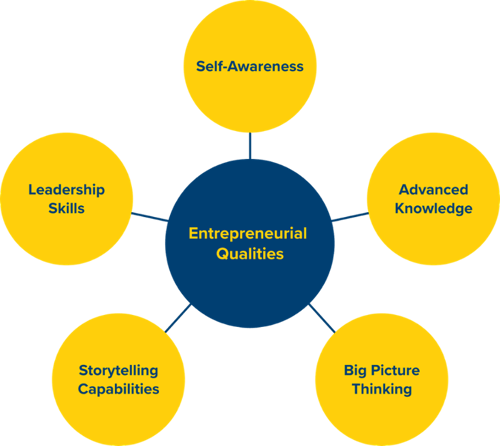
The decision to launch and run your own business venture can be a daunting and challenging one to make, but if you want to become an entrepreneur, you should know that with the right skills, knowledge, confidence, and sense of grit and determination, you can position yourself for serious entrepreneurial success.
With the necessary tools, you can A) nurture your own innate leadership skills, B) actually be your own boss, and C) be successful in a field that you're passionate about.
Let's dive into some of the data-driven research and tried-and-true tips that you need to leverage in order to succeed as an entrepreneur in today's rapidly-evolving business culture.
Acknowledge what you're actually good at:
In today's culture, most people are told that they can "do anything." It's time to acknowledge one fact: You. Can't. Be. Good. At. Everything. This acknowledgement, though, should be comforting to you, as an aspiring entrepreneur who wants to start a business.
Why, you may ask?
Well, for instance, not everyone is good at big picture thinking. Not everyone is a strategist. Not everyone has impeccable writing or researching skills. Not everyone is a financial guru. Not everyone has the extroverted personality that's normally associated with launching a startup. These are simply facts, and people's differences in strengths and skills should be celebrated.
And this is also why: If you can't be good at everything, it means that you can pinpoint where your strengths lie, and if you can pinpoint where your strength lie, you can use that knowledge to perpetuate success.
Celebrate your your individuality, and then use that knowledge to concentrate on developing the skills you naturally possess.

Choose how you're going to advance your knowledge:
So, as an aspiring entrepreneur, you're probably wondering why exactly you need formal education in order to prepare yourself to launch your own business venture. You're probably thinking — but what about Zuckerberg's Facebook? What about Gates' Microsoft? And what about Jobs' Apple Inc.? None of these startup giants even finished college!
It's smart to question how exactly you're going to advance your knowledge in order to succeed as an entrepreneur, but the facts are these: Only a very few number of professionals who do not obtain an advanced degree actually succeed as extremely successful entrepreneurs. If you do a little bit of research, you'll see that most entrepreneurs invest in earning an advanced degree.
For example, consider these entrepreneurs who earned a graduate degree prior to launching and running extraordinarily successful startup companies:
- WeWork — Adam Neumann
- Grab — Anthony Tan
- PayPal — Peter Thiel
- Stitch Fix — Katrina Lake
- Indigo Ag — Geoffrey von Maltzahn
- Arterys — Fabien Beckers
Pinpoint where, regionally, you want to start a business:
Silicon Valley. New York City. Seattle. Washington D.C.: These are the locations where people envision launching a business venture. That said, if you don't see yourself moving to one of these ultra-metropolis locations or if you're concerned that you don't have the financial stability to do so at this juncture, you should know that there are predictions for where entrepreneurs may be successful in the coming years.
In fact, Forbes predicts that "the 2020s are shaping up to be a period of hope for Middle America — especially when it comes to startups and technology. New technology and startup hubs are emerging beyond the Big Three, including in Atlanta and Toronto."
So, if you're looking to strategically launch a business venture in a region that is ready for entrepreneurial thought leadership, you should consider a region that is actively looking for the kind of expertise that you're looking to give. You should consider a region in America — or abroad — that's predicted to experience success when it comes to starting a business.
Consider how much starting a business will cost:
According to the U.S. Small Business Administration, most microbusinesses cost around $3,000, while most home-based franchises cost $2,000 to $5,000 to start. That said, you can probably imagine how much it costs to build a business at an even larger scale.
Perhaps one of the most important pieces of advice any future entrepreneur should take to heart is this: Take the time to save your money and have a plan for being financially stable during the "lean" years after you start your business. It takes time to build your brand and your customer base, so do not attempt to start a business without building your capital first.

Take inspiration from these stories, seriously:
[Podcast] How I Built This with Guy Raz
From NPR, How I Built This is a podcast that "examines the stories behind some of the world's best known companies. How I Built This weaves a narrative journey about innovators, entrepreneurs and idealists—and the movements they built."
[Book] Deep Work by Cal Newport
Newport's Deep Work is innovative yet practical, thoughtful yet straightforward. With research and wit, Newport examines the way in which today's overly-connected world promotes short attention spans, shallow work habits, and inefficient multitasking. By mastering the art of deep work habits, Newport suggests that you will be "better at what you do" and experience "the sense of true fulfillment that comes from craftsmanship." It's a must-read for any professional considering launching a successful business venture.
[Netflix Special] The Call to Courage
Brene Brown Ph.D. couples her bright personality and engaging storytelling with expert knowledge of vulnerability and empathy that she has acquired through her years of research. The Call to Courage is about embracing vulnerabilities, which are not weaknesses, but actually moments for strength, avenues to develop authentic courage, and opportunities for creativity, innovation, and dialogue. Part motivational speech, part personal storytelling, and part academic research, The Call to Courage is enlightening and inspirational for all who want to live lives full of joy and authenticity.
Take sustainability into consideration:
BSR Inc., the Business of Social Responsibility, is a global nonprofit organization that works with its network of more than 250 member companies and other partners to build a sustainable world. A powerhouse in the field of sustainable business, BSR asserts the notion that as our society becomes increasingly aware of the need for sustainable practices, the businesses that succeed and thrive in the future will need to place considerable emphasis on perpetuating sustainable business practices:
"Businesses that thrive in the future will be those that figure out how to harness these changes to address real human needs—placing sustainability at the heart of business strategy."
"Business will have the platform to play this role only if it champions an agenda that resonates with the public, and only if it is seen to be acting for the benefit of the greater good—for reasons that go beyond short-term financial gain. The payoff for business is substantial: the opportunity to help build support for progress on crucial issues, the creation of a more predictable operating environment, and, ideally, the restoration of trust."
Learn to live past the moment — think long term:
Did you know that according to the U.S. Small Business Administration Office of Advocacy, only about 50 percent of small businesses survive five years or longer? Did you know that 75 percent of startups fail? These high statistics can partially be attributed to the fact that many business owners get buried in the "day-to-day minutia of the business" instead of mastering the art of long term thinking and being deliberate about smart decision making that will positively affect the future of the business.
So, concentrate on the big picture, and don't let yourself get bogged down in the everyday stressors that are inevitably to come when launching your own business venture. Be bold, be strategic, and ask for help from other like-minded, ambitious professionals who know more than you. After all, according to Michael S. Dell, CEO of Dell Technologies, you "never want to be the smartest person in the room."
explore nu's types of business degrees:
So, what degree do you need to be an entrepreneur?
As more and more business employers seek to hire the best and brightest business professionals, the need for graduates who hold a specialized business graduate degree continues to rise. In response to this need, Neumann University now offers several specialized business degrees that are perfect for aspiring business leaders,
If you want to learn more about the types of business degrees offered at Neumann University, you can request more information, or if you’re ready, you can start your application. We can't wait to help you launch your entrepreneurial enterprise.

Explore our digital resource page: Types of Graduate Business Degrees — Which One is Right for You?
 CHALLENGE
CHALLENGE










